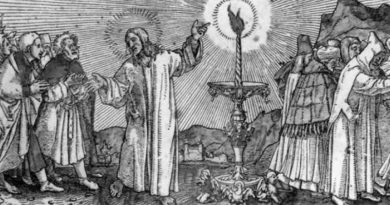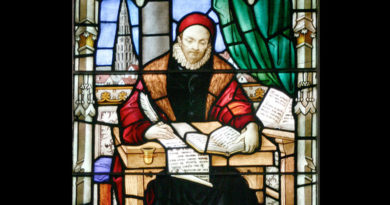Meditation upon a Christmas hymn: Confessing the Faith as we sing ’Of the Father’s Love Begotten’
Of the Father’s Love Begotten
Prudentius c. 400 Latin
Tr. by Rev. J.M. Neale 1854 & Rev. H.W. Baker 1861
DIVINUM MYSTERIUM 11th century
By Siobhan & Gerry Laskey
The hauntingly beautiful “Of the Father’s Love Begotten” transports us into the very Mystery of the Incarnation by a tune fittingly titled, “Divinum mysterium.” Unlike its jauntier carol cousins I don’t ever recall it being captured as mall Christmas ‘muzak.’
The hymn is a perfect liturgical ‘pairing’ with the traditional Christmas Gospel of John. Both draw us to peer into ‘the story behind the story’ –“The Word was made flesh…and we beheld His glory!” It also is a fitting accompaniment to our confession of the Faith in the Nicene Creed, and our joining in the song of the angels for the Holy Nativity, the Gloria in Excelsis, both part of our Christmas services.
This hymn feels like a fulfillment of the equally haunting and ageless Advent hymn, O Come, O Come, Emmanuel and the prelude to other timeless hymns of the Faith like St Patrick’s Breastplate. Hearing, and better still, singing these great ancient hymns allows us to feel a part of something infinitely bigger, older, deeper and grander. They take us out of ourselves and place us in the Presence of the Living God. They convey us, while still very much grounded in this world He loves so much, to the experience of the transcendent, numinous and, literally, awe-inspiring. They stir in us something at once strange and yet richly familiar as our deepest being resounds with the recognition of ‘the image of God’ and reaches out to grasp it in Him who is the very express image of the Father and descends to our plane to reach out to us with infant hands.
Let’s reflect, verse by verse, on this hymn reclaimed from the Early Church for us by the ingenious mind and pastoral heart of its translator, the Reverend John Mason Neale. In doing so, let’s interweave it with words from the Nicene Creed, the Gloria in Excelsis, and the Liturgies of the Church. In this way Scripture, Hymnody, Creed and Liturgy can re-echo and resound upon each other in our hearts and minds and voices.
Verse 1. Our creedal faith in Christ tells us He is “the only-begotten Son of God, Begotten of the Father before all worlds; God, of God; Light, of Light; Very God, of Very God; Begotten, not made; Being of one substance with the Father;” We can understand one generation being ‘begotten’ by the previous one – in time. But this begetting of Equal by Equal, with no before or after, no greater or lesser, is far beyond our understanding, yet without accepting this deep mystery of our Faith, none of the New Testament, or the life of the Church makes sense and calling Jesus “Alpha and Omega” would be unutterable blasphemy. Accepting the Mystery of the eternally begotten One, we now rightly praise the Son conceived in Mary’s womb as God’s Son too, and truly, “Beginning and End” – her Lord and ours, Evermore and evermore.
Verse 2. “Through whom all things were made” Nicaea’s Creed declares about this Eternally-begotten Son. And our hearts echo that Truth back in the hymn’s words, “at His word the worlds were framed.” Looking up at starry (or snowy) heavens on Christmas Eve we see age-old wonders of the sky, manifesting, here on ‘our fragile island home,’ the re-echoing throughout the cosmos of the results of “He commanded; it was done.” The Uncreated Light bathes us in remotest starlight that can take over 13 billion years to reach us, travelling at 186,000 miles per second, while tending this garden He has put under our stewardship “beneath the shining of the moon and burning sun.” Evermore and evermore.
Verse 3. When we confess, “Came down from heaven, And was incarnate by the Holy Ghost of the Virgin Mary, And was made man,” many outwardly (and all should inwardly) ’bend the knee.’ Of course, “that Birth for ever blessed” we sing of is the result of the holiest ‘pregnant pause’ ever, since we must never forget that the Incarnation truly begins at the very moment of the virgin-Conception of that tiny seed growing in Blessed Mary, coming to happy fruition when “the Babe, the world’s Redeemer, first revealed His sacred face.” Evermore and evermore.
Verse 4. A centuries-long line of prophecies come to fulfilment at Christmas. Zechariah is the one who prophesied the last Prophet, his own son, John the Baptist, proclaiming in his Spirit-filled song that, “the Lord God of Israel…hath visited, and redeemed his people…As he spake by the mouth of his holy Prophets, which have been since the world began.” We too confess, in our Creed, that the Holy Spirit has “spoken through the prophets.” In song we offer thanks to “the long-expected,” as Creation praises its Lord. Evermore and evermore.
Verse 5. Our creed confesses God as “Maker of heaven and earth, And of all things visible and invisible.” This speaks chiefly (besides strange new things that science investigates, such as dark matter) of the angelic realm. As with the Gloria in Excelsis, we are caught up into the celebration of the angelic hosts that praise “our God and King.” We, like shepherds and magi of old, are called to join with them in adoration at this festival of heaven come to Earth. “Let no tongue in earth be silent,” but let every voice “in concert sing.” Evermore and evermore.
Verse 6. This verse continues the theme of the whole Creation,” visible and invisible,” joining in unending adoration. Here, “all sorts and conditions” of people, old and young, are called, “with glad voices answering,” to “let their guileless songs re-echo” those of the angels. This calls us to take our part, as living members of His “One, Holy, Catholic and Apostolic Church” to render His most worthy praise. Evermore and evermore.
Verse 7. We end, fittingly, with a doxology, or praise of the Most Holy Trinity. The Son, being eternally “Begotten of the Father,” and now, “incarnate by the Holy Ghost of the Virgin Mary,” is worshipped by heaven and Earth in concert as the same One who “shall come again with glory” in the “eternal victory” of that kingdom “that shall have no end.” Let us all offer our “high thanksgiving” with “unwearied praises” for this Christ, Son of the Living God, who is now, by His Holy Incarnation and Blessed Nativity, also our very Brother. Let us continue, unworthy as we are, to offer this “our sacrifice of praise and thanksgiving” – not just throughout the great Twelve Days of Christmas, but truly, Evermore and evermore. AMEN! TAP
Siobhan & Gerry Laskey reside in the parish of Derby and Blackville in New Brunswick, where Gerry serves as Rector.



